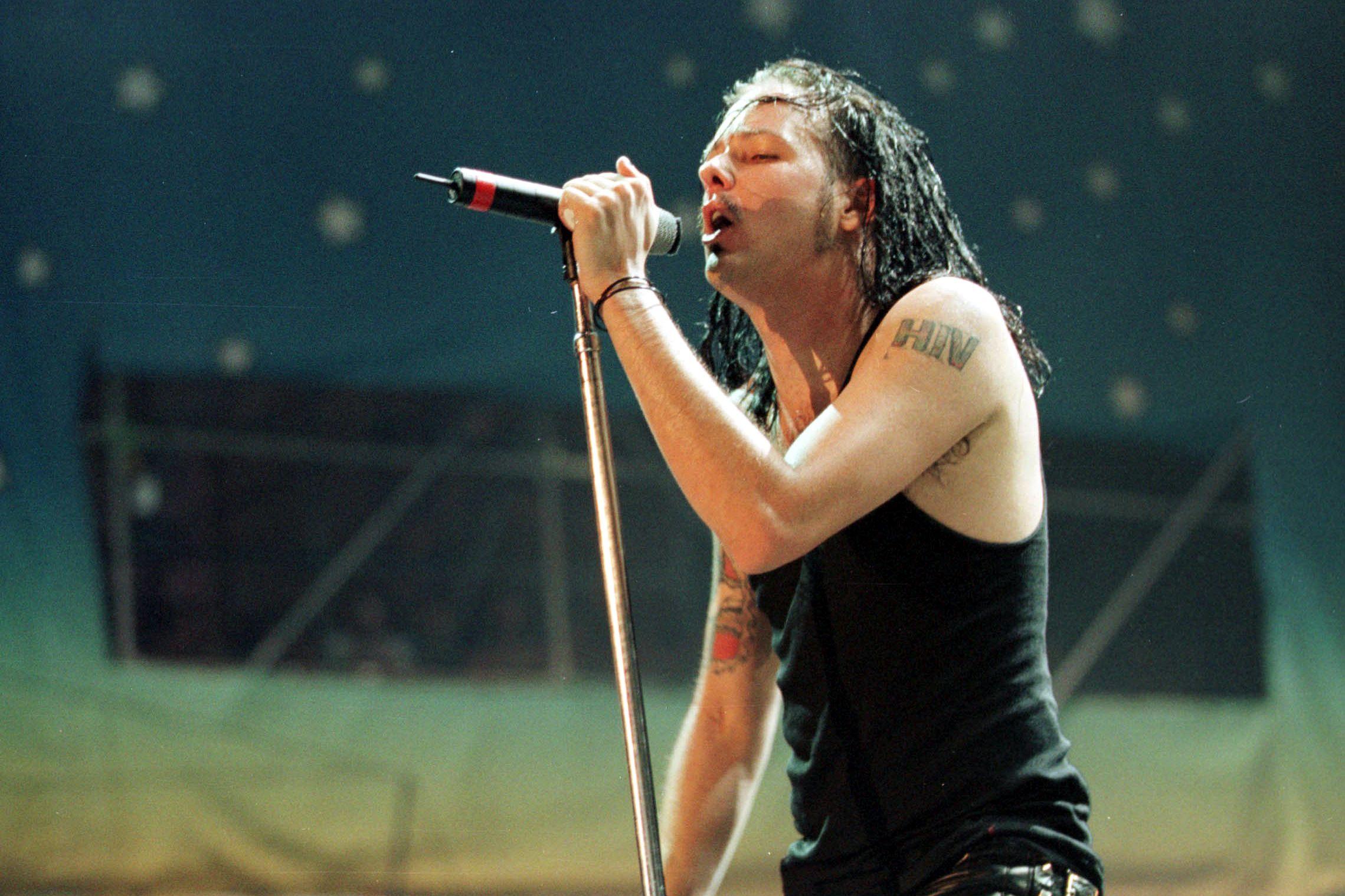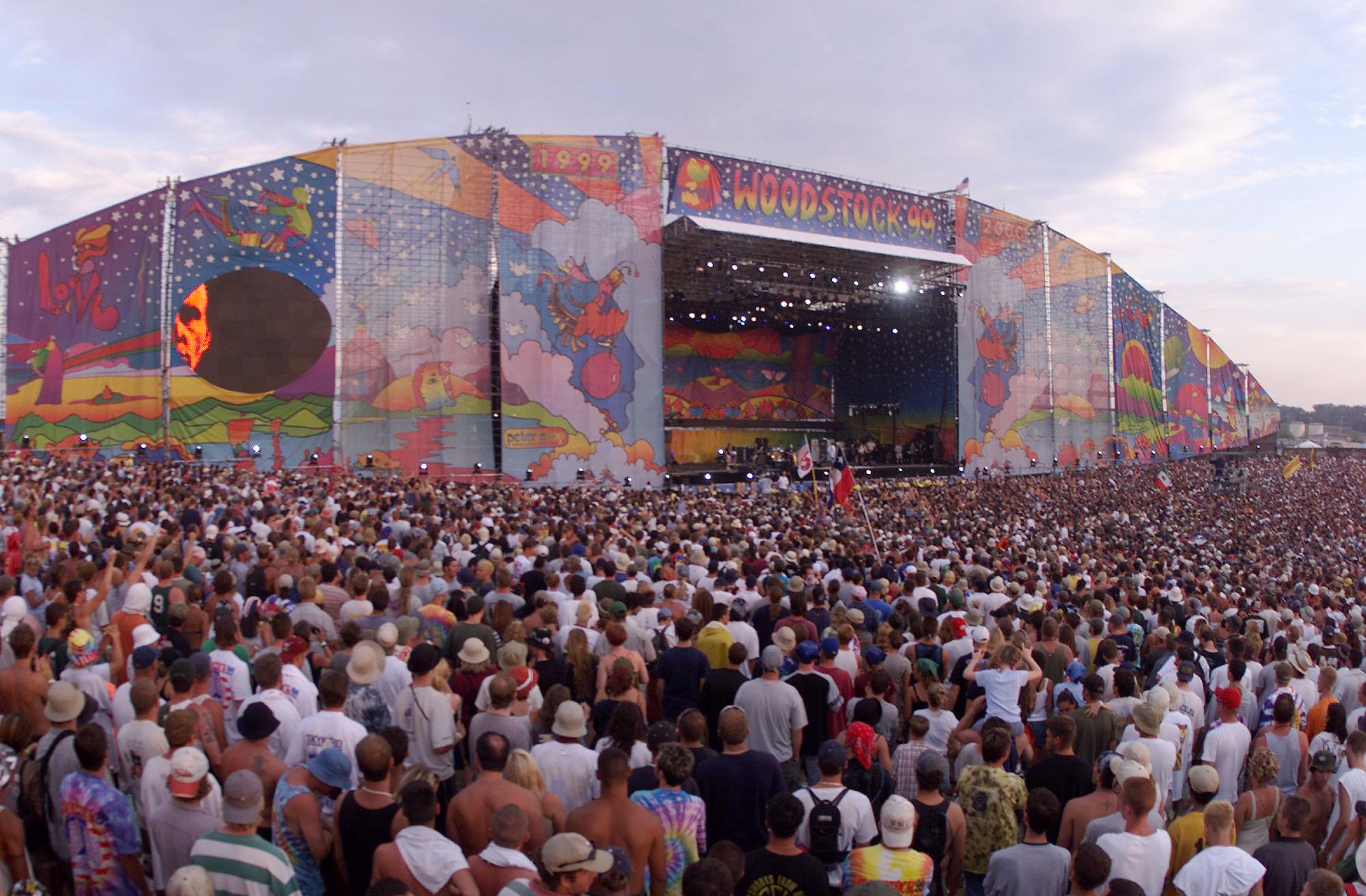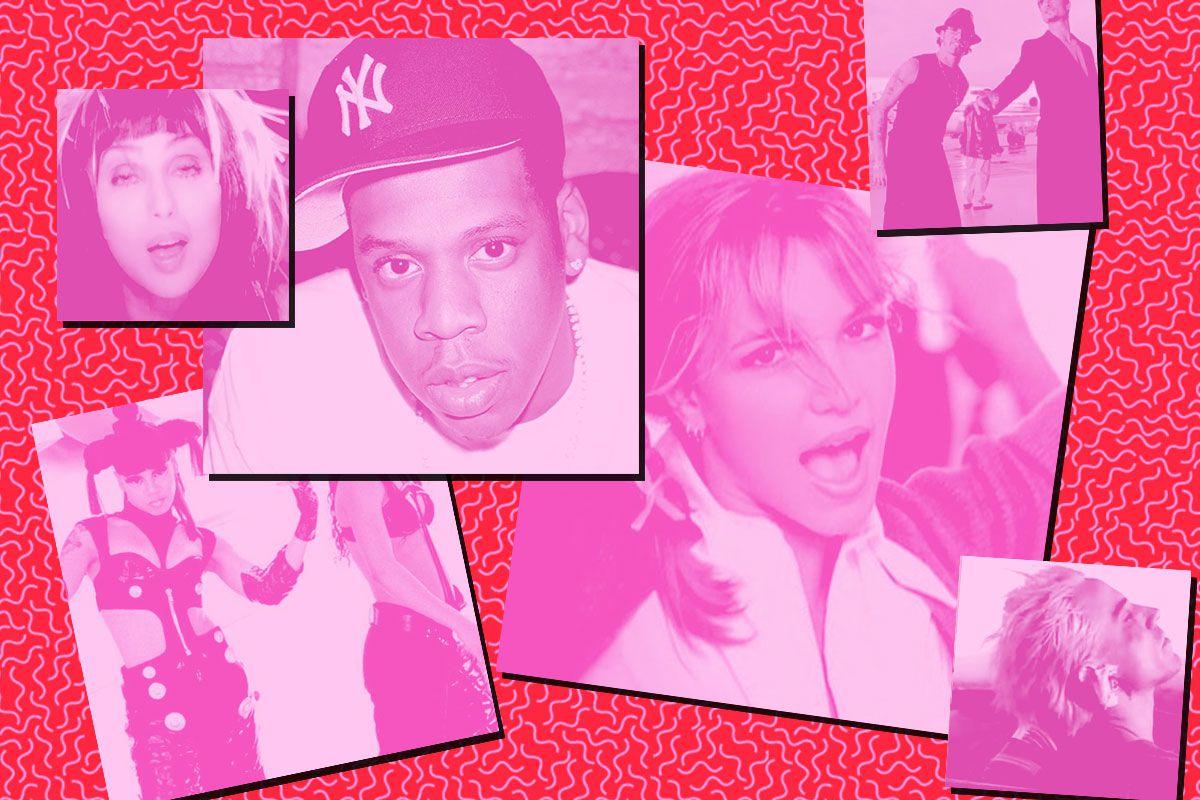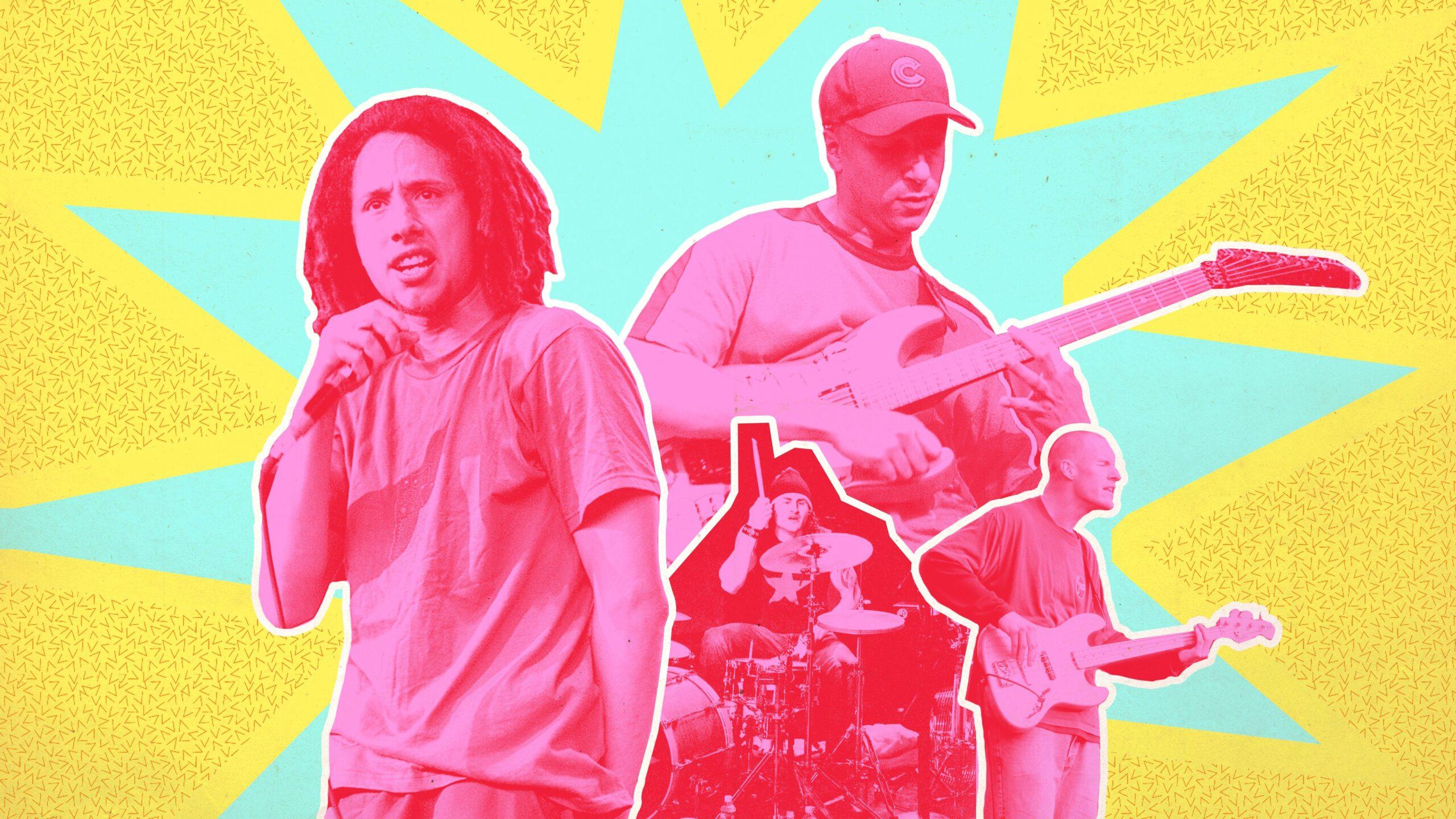How the Early Parts of Woodstock ’99 Set the Stage for Disaster
The first night of the festival was a relative calm before the chaos that the festival is best remembered for—but still contained some signs of trouble to comeEditor’s note, September 5, 2024: This piece was originally published on July 30, 2019, when the fourth episode of Break Stuff: The Story of Woodstock ’99 first released. To mark the recent 25th anniversary of the festival, The Ringer is resurfacing Break Stuff on its own dedicated Spotify feed.
In 1999, a music festival in upstate New York became a social experiment. There were riots, looting, and numerous assaults, all set to a soundtrack of the era’s most aggressive rock bands. Incredibly, this was the third iteration of Woodstock, a festival originally known for peace, love, and hippie idealism. But Woodstock ’99 revealed some hard truths behind the myths of the 1960s and the danger that nostalgia can engender.
Break Stuff, an eight-part documentary podcast series now available on Spotify, investigates what went wrong at Woodstock ’99 and the legacy of the event as host Steven Hyden interviews promoters, attendees, journalists, and musicians. We’ve already explored whether Limp Bizkit were to blame for the chaos, how the story of the original Woodstock is mostly a myth, and how the host town prepared for the festival. In Episode 4, Hyden looks at how the first night of Woodstock ’99 set the stage for what was to come.
As attendees filed into Griffiss Air Force Base for the first day of the festival, large crowds swelled around the east and west stages. And when I say large, I mean humongous. It’s estimated that 220,000 people attended the festival, plus an additional 10,000 who worked there.
“It was kind of an out-of-body experience when you play a big festival like that, you know, where you can’t see the end of the crowd,” said Noodles, a guitarist for the Offspring.
In 1994, Noodles’s band released Smash, a blockbuster that sold 11 million copies, making it the best-selling record ever to be put out by an independent label. Five years later, the Offspring were still big MTV stars. But even a band as popular as the Offspring was humbled by the size of Woodstock ’99.
“We flew over it on our way in,” he says. “The area that this festival took over was really just a huge, huge area. We’ve been able to fly over other festivals since and it’s one of the biggest for sure. So it looked kind of cool, we were really excited.”
Once the band touched down and arrived backstage, however, the grandeur of Woodstock ‘99 also came crashing down.
“The venue really wasn’t great,” he says. “You know, it wasn’t a very hospitable. So it was kind of bleak in that regard.”
The Offspring were scheduled to play after the rapper DMX and before Korn. On stage, the members of the band stared into a vast sea of humanity that stretched as far as the eye could see. Playing Woodstock ’99 was a pretty heady experience for a band that came up in the underground punk scene.
“It is a little overwhelming,” Noodles says. “We’ve done it so much now that I guess I get more and more used to it, but still there’s an energy there that’s unlike anything else, and I guess that was kind of fun. It was, I think, a little too much, just a little bit too big.”
Most musicians will say the most disorienting aspect of performing at an event as massive as Woodstock ’99 is the disconnection from the audience. Even in an arena, an artist can still see the people in the first few rows. But at Woodstock ’99, the distance between performer and fan was nearly insurmountable.
“You know, the audience was super far away, there were big cameras on tracks that were in between us and the crowd as well,” Noodles says. “So just kind of connecting with the audience was a little bit more difficult.”
But the band didn’t miss everything. There was one moment when Offspring singer Dexter Holland was able to discern some bad behavior in the audience. It occurred near the end of the band’s set, when Holland decided to comment on it.
“But you know what, I was noticing something, I gotta call your attention to it for just a second,” Holland said on stage. “I’ve been noticing that there’s a lot of girls coming over the top here crowdsurfing. And they’re getting really groped, you know what I mean. Now I think, just because a girl wants to go crowdsurfing or whatever, that doesn’t give a guy the right to molest ’em, know what I’m sayin’?”
It was, I think, a little too much, just a little bit too big.Noodles of The Offspring
Then, Holland said that the audience members should take matters into their own hands.
“If you’re a guy and you see a girl go overhead, give her a break,” he said. “If you’re a girl and you see a guy go overhead, I want you to grab his fucking balls!”
But again, in the moment, the bands were in a totally different world from the audience. And that surely affects the perspective of artists like Jonathan Davis, the lead singer of Korn. When he talks about Woodstock ’99, he doesn’t think about sexual assaults.
It was the biggest fucking group of people I ever saw in a festival setting like that in America, and all I know is our show was amazing,” Davis says.
Woodstock ’99 was the first concert that Korn had played in months. The band had been holed up in Los Angeles working on a new album. After so much hard work, playing a big concert in front of hundreds of thousands of people was a much-needed release.
“It was us, Limp Bizkit, Ice Cube, all these people,” he says. “We all chartered a big 737, and we all flew from L.A. to the site, and it was just amazing. We had a huge party on that plane, we were all just listening to music and having fun. We were playing craps and it was just amazing—an amazing experience.”
When you watch Korn’s performance on YouTube, you can see both what went right and what went wrong. On one hand, the band played incredibly—any signs of rust from not touring were obliterated by the nuclear-level energy coming off the crowd. On the other hand, you can see a female crowd surfer fighting off dozens of men attempting to grope her.
The separation between Korn and the audience is obvious. I wonder whether it was also apparent in the moment—I wasn’t there, but I suspect that the audience felt like it was in its own world. That feeling helps to embolden bad behavior. In the end, nobody seems to take responsibility for when things go sideways.
As for Jonathan Davis, it’s obvious that his adrenaline was jacked through the roof. He will never forget what it felt like to perform that night.
“I mean, it’s like no drug on earth,” Davis says. “For me, at least for Korn, when we play, I have a real intense connection with the crowd. I’ve never been a frontman that talks a lot but I think by the way that I perform and how emotions come across, that I touch something that makes people want to do that thing.”
He still remembers how the crowd reacted to the last song of the night.
“When we were doing ‘My Gift to You,’ and I had a lighter and I got everybody to put their lighters up in the air or when they were you know all jumping or just pumping their fist,” Davis says. “Those moments were really huge moments to have that many people doing it.”

For Davis, the only negativity associated with Woodstock ’99 happened backstage.
It was a feud with a band playing that night on the west stage, commonly regarded as festival’s B-list showcase.
“Insane Clown Posse wanted to fight us or some stupid bullshit that I don’t understand,” Davis says. “But Cube’s people put them in their place and that was it. That was the only drama.”
To this day, Davis is confused as to why Insane Clown Posse had a beef with Korn.
“I don’t even fucking know why they don’t like us,” he says. “I heard that they talked some other shit about us before too. I think they like to start shit just to get press or start a beef and get things going. I don’t know––I was a huge fan of ICP and that whole Juggalo thing. I think it’s cool.”
Here’s something you should know about me: I love band rivalries. I even wrote a book about it. And yet, in all of my research about Woodstock ’99, I hadn’t come across any information about a fight between Korn and Insane Clown Posse. I didn’t know about it until Jonathan Davis brought it up, unprompted.
Naturally, I now wanted to insert myself into some Korn vs. ICP drama. So I reached out to Violent J, who makes up Insane Clown Posse with fellow rapper Shaggy 2 Dope. And I asked him, “Hey, Violent J, why were you so mad at Korn back in 1999?”
According to Violent J, ICP didn’t have beef with Korn at all. In fact, the opposite was true. ICP worshipped Korn.
“What happened was, we kind of diss them in the lyric,” he says. “You know what I mean.”
In case you don’t know what he means: The diss lyric occurs in the song “Everybody Rize,” which mocks Jonathan Davis for a song he wrote about being bullied as a kid.
“It was uncalled for and it was stupid,” he says. “When we dissed them, it was an old lyric. So when we saw them we apologized for that and they had no idea what we were talking about.”
In my experience, Violent J isn’t really an accurate moniker. He was more like Gregarious J. I don’t think I talked to anyone who was happier to talk about Woodstock ’99. He was like a little kid talking about meeting Santa Claus for the first time.
“They drove us to the other stage,” Violent J says. “We hadn’t looked out, and we didn’t see the crowd or anything. And we came out and boom! It was just packed, and we were so happy. We couldn’t believe it. We were so excited, because it wasn’t like the other festivals we’d done. There was a lot of people there that would want to see us, you know, and that felt so good. It felt so cool to be a part of something.”
Insane Clown Posse formed in Detroit in 1989. From the beginning, they were outcasts—too rap for the rock crowd, and too rock for the rap crowd. Both sides seemed to agree that ICP were ridiculous. But Woodstock ’99 signified a rare moment of acceptance. Violent J finally felt like a true rock star.
“We always call ourselves the most hated band in the world,” he says. “And we’ve always played up the role that we like being the outcasts, you know? But in reality there’s always been an urge to want to be accepted to something. I mean, we want to be considered cool enough to be there. And that was like the ultimate reward. That that was something that really came through for us and felt that way.”
The band decided to show their appreciation by giving back to the audience at the concert.
“Yo, I know for Woodstock, tickets were a little expensive,” he said from on stage. “And me and Shaggy, we got paid a lot of money to be here. So we decided to give you all your money back.”
In reality there’s always been an urge to want to be accepted to something. I mean, we want to be considered cool enough to be there.Violent J of Insane Clown Posse
Then the band kicked a basket of red and yellow dodgeballs into the audience—each one with a $100 bill taped to it. And once those balls were gone, ICP kicked balls with $500 attached to them.
“We wanted to try to come up with some extra flavor for Woodstock,” he says now. “They were all jumping up trying to grab them, and that would just make the ball fly in the air again.”
Along with the free money, there was also some boorishness during ICP’s set. At one point, Violent J and Shaggy 2 Dope invited women to shed their tops onstage. Then they doused the women with Faygo soda.
When you watch the video, it all seems playful. The women appear to be doing this of their own volition, and having a good time. But in the harsh light of 2019, the whole thing seems pretty gross. It’s the sort of mindless decadence you associate with the fall of great empires.
The darkest impulses of Woodstock ’99 were already manifesting on Friday—two full days before tensions finally boiled over in the form of riots and looting.


